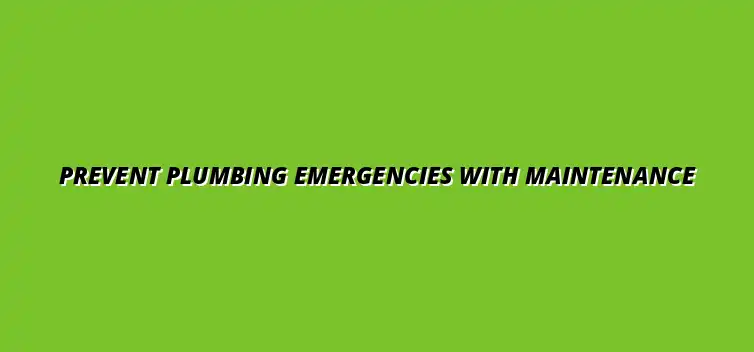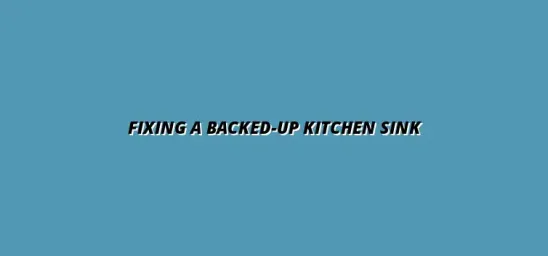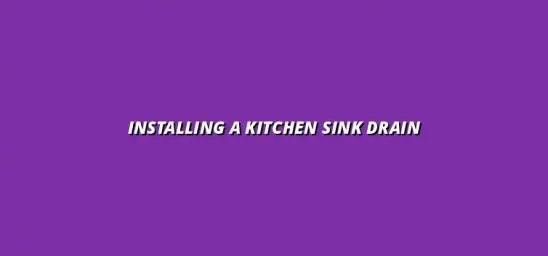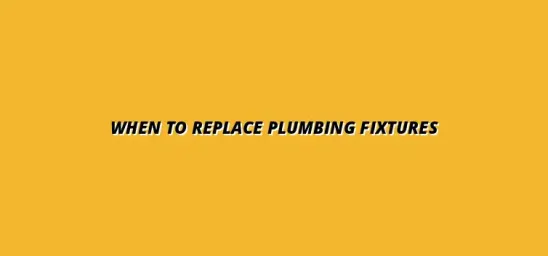
Prevent Plumbing Emergencies with Maintenance
Understanding the Importance of Plumbing Maintenance
When we think about home maintenance, plumbing often takes a backseat. However, understanding the importance of plumbing maintenance can save you from unexpected hassles. Regular checks not only keep your plumbing system in top shape but also ensure that your home remains a safe and comfortable environment.
Ignoring plumbing maintenance can lead to a variety of issues, from minor leaks to significant water damage. By prioritizing regular maintenance, you can enjoy peace of mind knowing that your plumbing is functioning properly. Let's explore why maintaining your plumbing is essential for every homeowner. For more specific tips on kitchen plumbing maintenance, check out these plumbing maintenance tips for homeowners.
How Regular Maintenance Prevents Plumbing Emergencies
Regular plumbing maintenance is much more than a routine check-up; it's a proactive measure to avoid emergencies. When we schedule maintenance, we give plumbers the chance to identify potential issues before they escalate. This not only saves you time and stress but also helps keep your home safe from damaging leaks or system failures.
Here are some key ways that regular maintenance can prevent plumbing emergencies:
- Early Detection: Spotting minor leaks or corrosion before they turn into major problems.
- Improved Efficiency: Ensuring that your plumbing system works efficiently, which can save on water bills.
- Increased Lifespan: Regular checks can extend the life of your plumbing components.
The Cost-Effectiveness of Regular Plumbing Checks
Investing in regular plumbing checks can actually save you money in the long run. Many homeowners are surprised to find that they can avoid hefty repair bills with just a bit of proactive care. For instance, fixing a small leak early on can prevent potential water damage that would require costly repairs!
Consider these cost-saving benefits of regular plumbing maintenance:
- Reduced Repair Costs: Addressing issues early can lower the cost of repairs significantly.
- Lower Water Bills: Preventing leaks means less wasted water and lower bills.
- Insurance Benefits: Some insurance companies may offer discounts for regular maintenance.
Long-Term Benefits of Maintaining Plumbing Systems
Long-term benefits of maintaining your plumbing systems are plenty! From improved functionality to increased property value, keeping your plumbing in good shape is crucial. You not only ensure smooth operations but also enhance the appeal of your home when it comes time to sell.
Regular maintenance results in benefits such as:
- Enhanced Home Value: A well-maintained plumbing system can boost your home's market value.
- Better Water Quality: Routine checks can help ensure clean, safe water for your family.
- Peace of Mind: Knowing that your plumbing is in good condition provides comfort and stability.
Identifying Key Areas for Regular Plumbing Maintenance
To keep your plumbing system functioning smoothly, it's essential to know where to focus your maintenance efforts. Identifying key areas that require regular attention can help you avoid common plumbing problems. Let’s take a closer look at some of these crucial aspects.
Common Plumbing Issues That Arise Without Maintenance
When plumbing systems are neglected, various problems can crop up. By understanding these common issues, you can take preventive measures to keep your plumbing in top shape. Regular checks can help you spot these issues before they become major headaches!
- Clogged Drains: Food particles, hair, and grease can build up and cause blockages. Learn more about effective drainage solutions for homes to avoid costly repairs.
- Leaky Faucets: Even a small drip can waste a lot of water over time.
- Running Toilets: This can waste gallons of water each day if not addressed promptly.
Leaky Faucets and Their Impact on Water Bills
Leaky faucets may seem like a minor annoyance, but they can significantly impact your water bills. A small drip from a leaky faucet can waste up to 3,000 gallons of water a year! Taking the time to fix these leaks during regular maintenance can save you money and reduce water waste.
If you notice a leaky faucet, consider the following steps:
- Identify the Leak: Check washers, O-rings, and the faucet body for damage.
- Replace Parts: Sometimes, replacing a simple washer can solve the issue.
- Call a Professional: If you're unsure, it’s best to get help from a plumber. If you need a plumber in Bournbrook, Birmingham, we can help!
Clogged Drains: Causes and Solutions
Clogged drains are another common plumbing issue that can lead to costly repairs if not handled promptly. Hair, soap scum, and food particles can all contribute to clogs. Understanding the causes can help you take preventative steps to keep your drains flowing smoothly!
To prevent clogged drains in your kitchen, consider these tips and learn how to prevent kitchen sink blockages easily.
- Use Drain Guards: They can catch hair and debris before they enter your pipes.
- Avoid Pouring Grease: Dispose of grease in the trash, not down the drain.
- Regular Cleaning: Clean your drains periodically with baking soda and vinegar.
Essential Plumbing Components Requiring Regular Attention
Understanding which plumbing components need regular attention is crucial for effective maintenance. Neglecting these areas can lead to unexpected emergencies and costly repairs. Let's look at the essential components to keep an eye on!
Water Heaters: Maintenance Tips for Longevity
Your water heater is a vital part of your home's plumbing system. Proper maintenance can extend its lifespan and ensure it operates efficiently. Regularly checking your water heater can prevent issues like leaks and inconsistent water temperatures. For tips on maintaining your water heater efficiently, visit our water heating page.
Here are some maintenance tips for your water heater:
- Flush the Tank: Remove sediment buildup by flushing your water heater once a year.
- Check the Pressure Relief Valve: Test it annually to ensure it functions properly.
- Insulate Pipes: This helps maintain the water temperature and reduces energy costs.
Pipes and Fixtures: Signs of Wear and Potential Failures
Pipes and fixtures can wear down over time, leading to potential failures if not monitored. Cracks, rust, and corrosion are all indicators that you need to take action. Regular visual inspections can help you detect these issues before they escalate!
Keep an eye out for these signs:
- Discoloration: Brown or rust-colored water can indicate pipe corrosion.
- Unusual Noises: Sounds like banging or rattling might signal pipe problems.
- Visible Leaks: Any signs of moisture around pipes should be addressed immediately.
With regular plumbing maintenance, you can keep your home running smoothly and avoid costly repairs. Taking the time to understand the importance of plumbing care will lead to a healthier and more functional living environment!
Addressing Common Concerns About Plumbing Maintenance
Many homeowners have questions regarding the best practices for plumbing maintenance. It’s completely normal to wonder how often these checks should happen and what factors play a role in determining that frequency. Understanding these concerns is crucial for effective plumbing upkeep and can lead to fewer emergencies down the line!
In this section, I’ll share insights into how often plumbing maintenance should be done, along with answers to frequently asked questions. By the end of this guide, you’ll feel more confident about taking care of your plumbing system!
How Often Should Plumbing Maintenance Be Done?
When it comes to plumbing maintenance, timing is everything! Regular checks can help spot potential issues before they become major headaches. Generally, I recommend scheduling a plumbing inspection at least once a year.
However, some factors can affect how often you should conduct maintenance:
- Aging Plumbing Systems: Older pipes may need more frequent checks to prevent leaks.
- Local Climate: Extreme weather can put additional stress on plumbing components.
- Usage Patterns: Households with many occupants or frequent guests may require more attention.
By taking these factors into account, you can customize a maintenance schedule that works best for your home.
Factors That Affect Maintenance Frequency
In addition to the general guidelines, several key factors can influence how often you should maintain your plumbing:
- Type of Plumbing: Homes with older pipes may need more inspections.
- Water Quality: Hard water can lead to mineral buildup, requiring more regular checks.
- Previous Issues: If you’ve had plumbing problems in the past, it’s wise to be proactive.
Tailoring your maintenance schedule to these factors can help prevent emergencies and save you money in the long run!
Customizing Maintenance Schedules Based on Home Age
The age of your home can greatly impact your plumbing maintenance needs. For example:
- Homes Under 10 Years Old: Typically require basic maintenance and inspections every 1-2 years.
- Homes 10-30 Years Old: Should consider annual inspections to check for wear and tear.
- Homes Over 30 Years Old: May need semi-annual inspections to address potential plumbing issues.
By adjusting your schedule based on the age of your home, you can ensure your plumbing system remains in good shape.
Answers to Frequently Asked Questions About Plumbing Care
As a homeowner, it’s important to be informed about the common queries surrounding plumbing care. This knowledge can empower you to take better care of your plumbing system and avoid costly repairs!
Let’s dive into some frequently asked questions that can help clarify plumbing maintenance practices. For essential bathroom plumbing maintenance tips, see our guide on essential bathroom plumbing maintenance tips.
What Are the Early Signs of Plumbing Issues?
Being aware of the early signs of plumbing problems can save you from larger issues later on. Here are some red flags to look out for:
- Unusual Sounds: Hearing gurgling or banging can indicate a problem.
- Water Stains: Dark spots on ceilings or walls may suggest leaks.
- Lower Water Pressure: A sudden drop in pressure can signal a problem in your pipes.
If you notice any of these signs, it’s a good idea to investigate further or consult a professional!
How Can Homeowners Educate Themselves on Plumbing Maintenance?
Staying informed about plumbing maintenance is a great way to empower yourself as a homeowner. Here are some practical ways to educate yourself:
- Online Resources: Websites and blogs dedicated to DIY plumbing can be invaluable.
- Local Workshops: Many hardware stores offer classes on home maintenance, including plumbing.
- Consult with Professionals: Don’t hesitate to ask questions when a plumber is at your home! If you're dealing with a clogged kitchen sink, see our guide on fixing a clogged kitchen sink.
By actively seeking out information, you’ll gain confidence in maintaining your plumbing system.
Summarizing the Role of Regular Maintenance in Preventing Plumbing Emergencies
To wrap things up, regular plumbing maintenance is **essential** for preventing costly emergencies. By understanding the importance of routine checks, you can ensure your plumbing system runs smoothly and efficiently.
Let’s highlight some key takeaways that can help shape your approach to plumbing care!
Key Takeaways for Homeowners
Regular plumbing maintenance can save you time, money, and stress. Here are some important points to remember:
- Schedule Regular Inspections: Aim for at least yearly checks based on your home's age and plumbing condition.
- Beware of Warning Signs: Early detection of plumbing issues is key to avoiding emergencies.
- Educate Yourself: Knowledge is power! Learn about your plumbing system and how to care for it.
Building a proactive routine can lead to fewer headaches and better overall home maintenance!
Establishing a Proactive Plumbing Maintenance Routine
Creating and sticking to a plumbing maintenance routine can significantly improve the lifespan of your plumbing systems. Regular checks and timely attention to minor issues can prevent larger problems from arising.
Here are some steps you can take:
- Set Reminders: Use a calendar or app to remind you of scheduled inspections.
- Keep a Maintenance Log: Document all maintenance activities and any issues encountered.
- Involve the Family: Educate those living in your home about plumbing care!
Having a routine in place can create a safer and more efficient living environment!
Building a Relationship with Trusted Plumbing Professionals
Having a reliable plumber you trust can be a game-changer. It’s essential to build a rapport with a plumbing professional who understands your needs and can offer consistent support and advice.
Consider these steps:
- Research Local Plumbers: Look for reviews and ratings in your area.
- Ask for Recommendations: Friends and family can provide insights into reputable professionals.
- Establish Communication: Discuss your plumbing concerns openly and ask questions!
A strong relationship with your plumber can provide peace of mind and better plumbing care.
Encouraging Action for Better Plumbing Care
Now that you’re equipped with this information, it’s time to take action! Implementing a solid maintenance routine can go a long way in keeping your plumbing system functioning smoothly.
Here are some steps you can take right away:
- Create Your Checklist: Start your plumbing maintenance checklist today!
- Schedule an Inspection: If it’s been a while since your last check, now is the time!
- Stay Educated: Keep learning about plumbing care through various resources.
Taking these steps now can save you time and money in the future!
The Value of Investing Time and Resources in Plumbing Maintenance
Investing in plumbing maintenance isn’t just about fixing leaks; it’s about protecting your home and ensuring the comfort of your family. Regular checks and proactive care can significantly reduce the risk of emergencies.
In the long run, the time and resources spent on maintenance are well worth the peace of mind and savings on repairs. So, let’s commit to making plumbing care a priority!





Fixing a Backed-Up Kitchen Sink
Prepare Your Plumbing for Weather
Installing a Kitchen Sink Drain
When to Replace Plumbing Fixtures
Fixing a Jammed Garbage Disposal